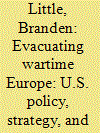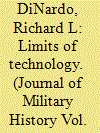|
|
|
Sort Order |
|
|
|
Items / Page
|
|
|
|
|
|
|
| Srl | Item |
| 1 |
ID:
141795


|
|
|
|
|
| Summary/Abstract |
While the Roud Index at the Vaughan Williams Memorial Library in London contains over 19,000 folk songs about wars waged by Britain and its allies, there are comparatively few composed specifically about World War One. This article explores the musical heritage of the Great War in the songs about the conflict that have been composed, or rearranged, by singers in the early twenty-first century. By studying folk songs sung during the war itself, we can learn how new folk songs draw on historical elements to create a new World War One folk canon.
|
|
|
|
|
|
|
|
|
|
|
|
|
|
|
|
| 2 |
ID:
141796


|
|
|
|
|
| Summary/Abstract |
The influence of weather conditions on combat operations has not received the attention it deserves from military historians. No better example can be provided, however, of the sometimes determinant effect of weather on the course of battle than the impact of severe flooding on the outcome of the U.S. Civil War battle of Shiloh, fought between Union and Confederate armies in southwestern Tennessee on 6-7 April, 1862.
|
|
|
|
|
|
|
|
|
|
|
|
|
|
|
|
| 3 |
ID:
141788


|
|
|
|
|
| Summary/Abstract |
The U.S. government facilitated the repatriation of more than 125,000 Americans stranded in Europe upon the outbreak of the First World War in 1914 by declaring neutrality and dispatching the U.S. Relief Commission, which comprised U.S. warships carrying gold to assist desperate citizens. Participating U.S. officers conducted unauthorized tours of battlefields and arms plants to glean intelligence that would aid American mobilization plans. The relief commissioners and many of the Americans they aided, moreover, championed additional humanitarian interventions in war-torn regions and catalyzed the defense preparedness movement in the United States.
|
|
|
|
|
|
|
|
|
|
|
|
|
|
|
|
| 4 |
ID:
141792


|
|
|
|
|
| Summary/Abstract |
In support of the claim that Marshal Ferdinand Foch’s appointment to supreme command made a difference to the final year of the First World War, this article analyses seven examples of his actions and decisions. Four are taken from the period March–July 1918, when the Allies were resisting the German offensives, and two from August–September 1918, when the Allies counter-attacked. The final example concerns Foch’s role in the armistice negotiations.
|
|
|
|
|
|
|
|
|
|
|
|
|
|
|
|
| 5 |
ID:
141791


|
|
|
|
|
| Summary/Abstract |
The invasion of Serbia in October 1915 saw the Serbian army, which had fought off three separate invasions by Austria-Hungary the year before, driven out of Serbia within six weeks. A critical land route to Turkey and Bulgaria was opened, and Austria-Hungary’s southern flank was secured. The forces of the Central Powers made extensive use of the most modern technology of the day—including railroads, bridging, aircraft, artillery and telephone—and demonstrated their potential. This article suggests that while they gave the Central Powers a major edge early, the campaign also revealed the limits of these technologies.
|
|
|
|
|
|
|
|
|
|
|
|
|
|
|
|
| 6 |
ID:
141794


|
|
|
|
|
| Summary/Abstract |
The Arras Belfry, an oil painting by the French artist Fernand Sabatté, is held at the National Gallery of Ireland in Dublin. It depicts the destruction of the town’s late medieval belfry by German artillery in 1914 and is part of a genre of First World War propaganda imagery known as the “martyred towns” series. This imagery was so popular at the time that when destruction visited Dublin during the Easter Rising in Ireland in 1916, the city became known as “Ypres on the Liffey.” Artist Sabatté was a French army officer based in Arras in Northern France where he was in charge of salvaging artworks from medieval churches and town halls destroyed in the fighting.
|
|
|
|
|
|
|
|
|
|
|
|
|
|
|
|
| 7 |
ID:
141790


|
|
|
|
|
| Summary/Abstract |
As commander of French forces in World War I from August 1914 until December 1916, General Joseph Joffre is one of the most controversial leaders of the war. As victor of the “miracle” of the Marne, he earned almost universal respect and admiration, but in subsequent years he came under scathing criticism for the enormous French casualties and for his failure to drive the Germans out of France. A strong supporter of the American Expeditionary Forces, he was praised by General John J. Pershing as “my loyal and consistent personal friend.” This article attempts to determine whether Joffre’s failures outweigh his successes in the enormously destructive and complex war.
|
|
|
|
|
|
|
|
|
|
|
|
|
|
|
|
| 8 |
ID:
141793


|
|
|
|
|
| Summary/Abstract |
The sinking of the Lusitania sharpened debate in Washington over whether the United States should make the defense of neutral rights a casus belli. The hard line that President Woodrow Wilson adopted regarding German violations of neutral rights caused his secretary of state to resign in protest, with the redlines established in 1915 generating a precarious neutrality that lasted less than two years. This article examines the links between Wilson’s wartime policies, the revisionist literature of the interwar period, and the Neutrality Acts of the mid-1930s. It argues that “history’s lessons” may mislead rather than inform if context is ignored.
|
|
|
|
|
|
|
|
|
|
|
|
|
|
|
|
|
|
|
|
|